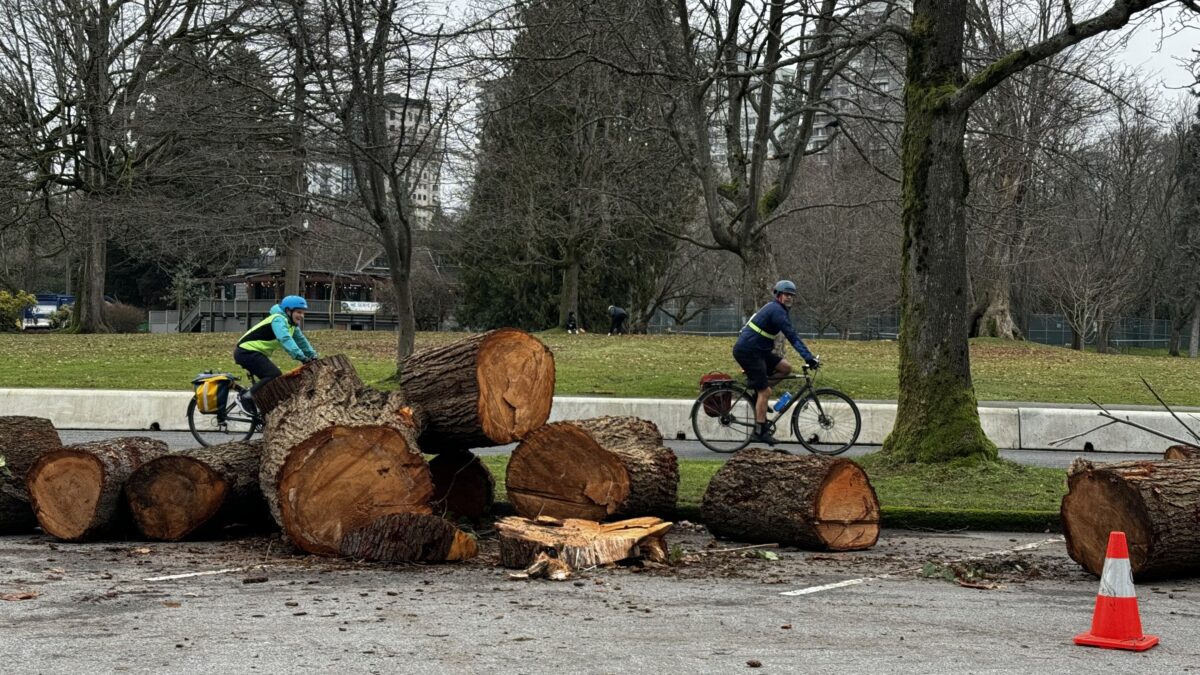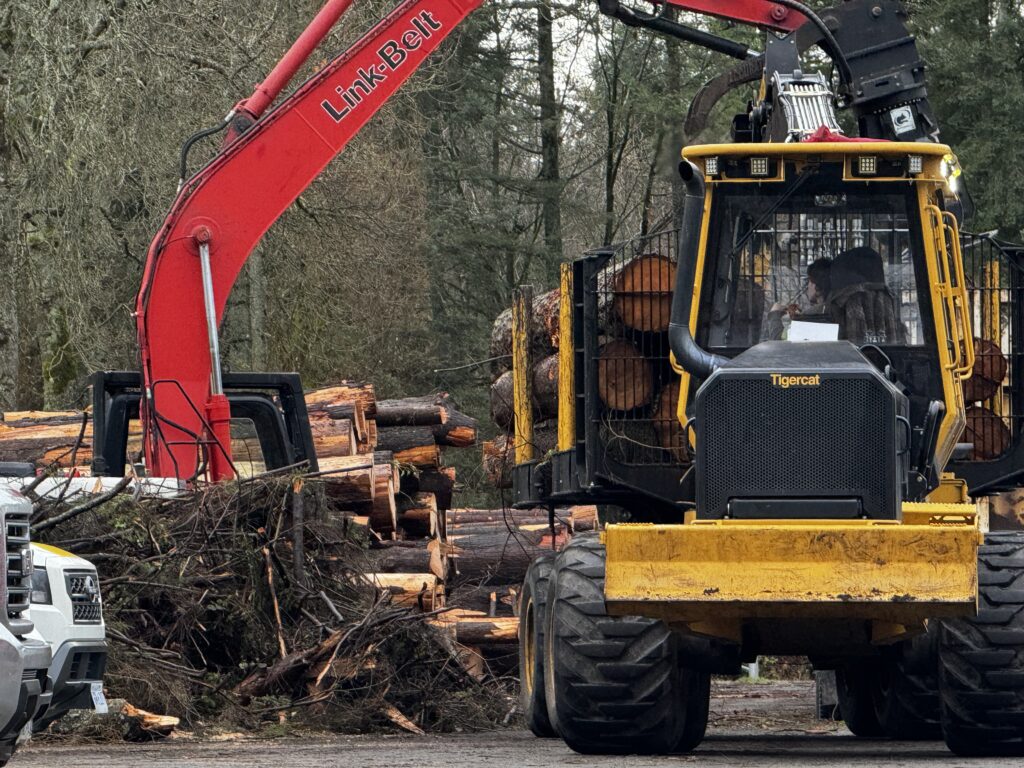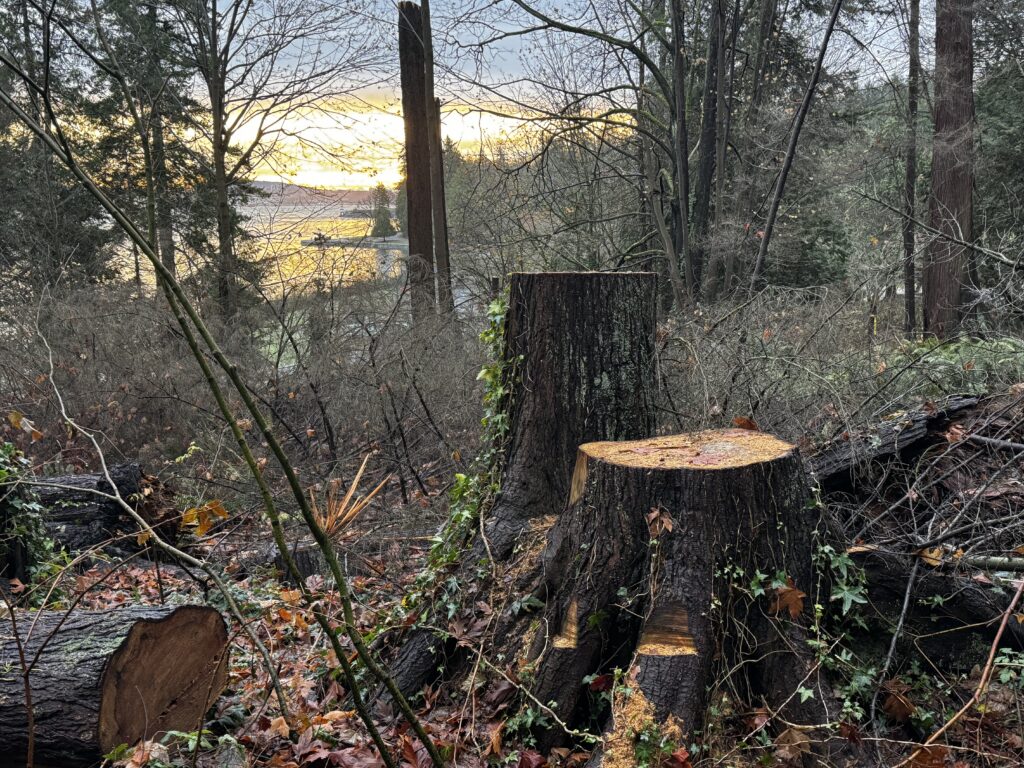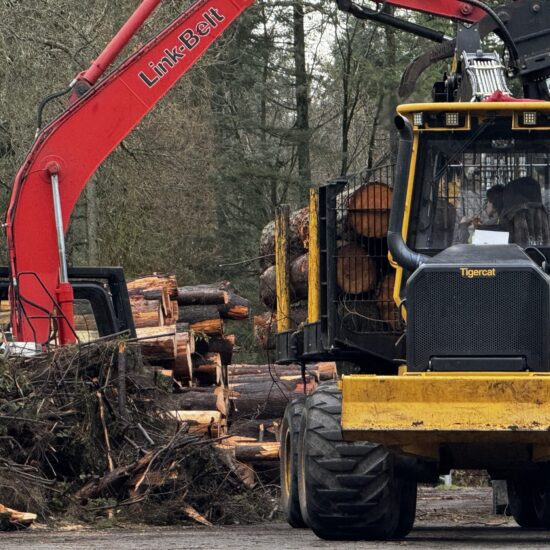
Briefly: A B.C. Supreme Court judge threw out a negligence lawsuit from a group of citizens contesting city hall and the parks board’s $18 million operation to log Stanley Park trees affected by the Hemlock looper moth infestation. The Stanley Park Preservation Society is pondering next steps.
Bob Mackin
The Stanley Park Preservation Society won a battle but lost the war.
In an Oct. 1 written decision, B.C. Supreme Court Justice Maegen Giltrow refused to grant the self-represented group an injunction to halt the $18 million operation to log Stanley Park trees damaged or killed by the Hemlock looper moth infestation.

Crews load logged Stanley Park trees at a makeshift yard in the Prospect Point Picnic Area (Bob Mackin photo)
The plaintiffs — software developer Michael Robert Caditz and homemaker Katherine Caditz, holistic health educator Anita Hansen and schoolteacher Jillian Maguire — had accused the City of Vancouver, Vancouver Board of Parks and Recreation, urban forestry manager Joe McLeod and forestry contractor B.A. Blackwell and Associates of negligence. The group, originally called Save Stanley Park, said the logging that began last fall caused its members stress, anxiety, sadness and fear.
The judge acknowledged the group opted for a negligence lawsuit instead of filing for a judicial review, because there was no “transparent and considered decision” made by the park board to respond to infestation. Blackwell said it affected 160,000 trees, or a third of the park, and was necessary for public safety.
The judge said the quartet “raised credible and legitimate questions about the process,” which played out behind closed doors for more than a year. She also acknowledged that Iain Dixon, the lawyer for the city and park board, conceded in court “that being able to identify the decision maker in this case is ‘a little murky’.”
By contrast, Giltrow wrote, park board commissioners regularly vote on decisions that affect Vancouver parks that “on their face, appear of at least comparable consequence to the decision to remove up to one-third of the trees in Stanley Park.”
The only resolution about Stanley Park’s tree health at an open meeting of the commissioners was July 10, 2023 when they voted for staff to develop an updated risk management program. But Giltrow said it was not clear whether the plan was ever developed or submitted to the commissioners
So, the “group of citizens has put their hands up and said something is amiss. It may well be; in fact, the public respondents acknowledged this possibility during the hearing of this matter.”

Stumps and fallen trees near Lumbermen’s Arch in Stanley Park (Bob Mackin photo)
Giltrow, however, said what the plaintiffs sought was an untenable precedent and their application did not meet the legal test to trigger an injunction.
“I am of the view that it is unlikely that a novel duty of care would be found against any of the defendants at trial,” she concluded.
Asked if the society would appeal, Michael Robert Caditz said that the judge “misunderstood our case.”
“We are waiting to see what Park Board does before deciding how to proceed,” Caditz said.
The society, however, did succeed in bringing sunshine to the issue. The city disclosed hundreds of pages of internal reports, minutes and email to the plaintiffs. One of the key documents was a confidential June 3 memo to park board commissioners that said Mayor Ken Sim’s ABC majority city council unanimously consented to an $11.1 million “budget adjustment” during a closed-door May 28 meeting.
The city’s lawyer also said during the Sept. 16 and 20 court hearing that Blackwell’s latest contract, awarded in June, will see another 30 hectares of low tree density but high consequence areas logged during this fall and winter’s phase. Blackwell estimates 6,000 trees — of which 2,000 are greater than 20 centimetres in diameter — will be removed. Last fall and winter, Blackwell subcontractors took down more than 7,200 trees.
“Counsel for the public respondents also advised that there is not currently a plan to ultimately remove all 160,000 dead or dying trees; however, about 12.5% [or 20,000] of the approximately 160,000 are greater than 20 centimetres and the public respondents do expect to remove those,” the judge said. “Of the remaining dead or dying trees, many may not be removed.”
Park board commissioners are expected to receive an update at their Oct. 7 open meeting from staff on the second phase. A staff report said the operation is scheduled to restart in mid-October, affect trails and Stanley Park Drive, and include “complex helicopter work above the seawall.” Restoration is scheduled for March 2025.
“Should the board not approve staff’s recommendation related to phase two work, staff would halt planned operations and report back to the board, on an expedited timeline, on planned closures and impacts (financial and operational),” the report said.
Support theBreaker.news for as low as $2 a month on Patreon. Find out how. Click here.











